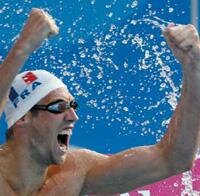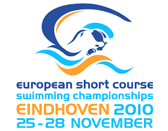
Gaul has never had it so good
No matter which way you turned at the Alfred Hajos pool on Margaret Island, there was a Frenchman in a rush: 20 finals, 15 of them featuring France on the podium, eight of the golds for the best team in town, with Camille Lacourt cream of the crop through a backstroke breakthrough that transcended suits and only Paul Biedermann (GER) able to break a stranglehold on freestyle events dominated by the colour blue.
With 16 championship records among men on the scoreboard, France had reason to be the most cheerful, nine of the new standards coming its way as Gaul celebrated two prizes that had never come its way before: best male team and best overall team trophy at the European showcase. On the transition to textile-only suits, the change on the clock was unavoidably obvious: the new meet standards indicate that the continental is gaining in speed, while just one European record over seven days of racing, to Lacourt on 52.11sec in the 100m backstroke, tells the tale of the performance-enhancement in suits now banned. Seven of the 20 men?s title on offer were defended successfully, nine went to new holders, while four were not defended at all.
There was no escaping the success story of the championships. The French gold rush came to a thumping conclusion on the final Sunday of racing when Frederick Bousquet in the 50m freestyle and the men?s 4x100 medley relay in which the sprinter swam the ?fly leg secure the LEN Trophy for France on points and placed it one gold medal clear of Russia. In all, the French won 8 gold, 7 silver and 6 bronze, 17 of those 21 prizes won by the men.
The front page headline in L?Equipe summed up the final relay and the overall (mainly male) squad result with a scream: "The Golden team". Le Coq of the walk was Camille Lacourt, coached by former French international Romain Barnier at Marseilles, a club that accounted for 11 of France?s 21 medals. The backstroke ace had been in the picture for a while but not the main focus of world attention. In times of 24.07 and that lone European standard of 52.11 over 50m and 100m respectively, the 25-year-old was a league ahead of the rest of the continent in the water, on the clock and in points.
If Lacourt doubled on backstroke, just one gold on freestyle dominated the swim headlines in France and around the world like no other in the week of Budapest. At 18, Yannick Agnel was still dripping in the gold of his junior titles when he rose to his blocks for battle against world champion and record holder Paul Biedermann (GER) in the 400m freestyle. The courage of youth paid off, Agnel holding off Biedermann for gold in 3:46.17 and prompting L?Equipe to devote its entire front page to "Agnel ? Superstar!"
Courtesy of a tough selection policy aimed at instilling in France?s future troops easy speed through qualification rounds in order to ensure passage to finals in a fashion that conserves energy for the bigger swim, Agnel was not selected for the 200m, and Biedermann stepped up to retain the four-lap crown in style on 1:46.06. Fans were not, as it turned out, denied a clash of 200m titans: in the 4x200m freestyle relay, France, Germany and Russia fielded their fastest first and it was Biedermann who handed over first, on 1:45.47, Agnel on 1:45.83, Nikita Lobintsev on 1:45.93 (a start that led to a 7:06.71 champion-record victory for Russia), all three men inside the German?s title-winning time.
At the deep end of distance, Sebastien Rouault did the double: he became the first Frenchman in 76 years to win the 1,500m crown, and did so in 14:55.17, the fastest in the world in 2010 at that point (though Ryan Cochrane, of Canada, wasted no time in topping him, with a 14:49.47 victory at Pan Pacific Championships in California a week later); then he added the 800m title in a championship record of 7:48.28. Here was a prime example of an athlete for whom shiny suits were a nightmare. The FINA decision to ban bodysuits and non-textile was critical. "I asked myself the question whether it was worth continuing at all. The bodysuits did not give me an advantage due to my build. I was considering stopping ? If they had been kept, if the suits had remained, I would probably have quit...," said Rouault. Two of those who were winners in a time of polyurethane, Fred Bousquet and Alain Bernard stepped up to be winners again in jammers. Bousquet took the 50m freestyle in the fastest ever title win seen in a textile suit, 21.49, while Bernard retained the 100m crown by just 0.3sec, in 48.49, ahead of Evgeny Lagunov and French teammate William Meynard, just 0.07sec behind the champion.
It was Lagunov who led the Russian 4x100m freestyle relay to victory over France (and Bernard) on the first day of the championships, Daniil Izotov passing Bernard on the way home to claim the crown in the face of a paper exercise that suggested the French could not lose. The result contributed to Bernard being replaced by Fabien Gilot in the medley relay won by France over Russia on the last day of the championships.
Russia enjoyed two other golden successes, both Stanislav Donets (RUS), in the 200m backstroke, and Evgeny Korotyshkin (RUS), in the 100m butterfly, retaining their 2008 crowns. Alex Dale Oen (NOR) also repeated his success of Eindhoven, and did so in a championship record of 59.20 in the 100m breaststroke to take the helm of the 2010 world rankings.
The most popular title defenses of the week, however, as far as the partisan crowd was concerned, were the medley victories of a superb technician called Laszlo Cseh. In a tight battle with Markus Rogan (AUT) until the last turn, Cseh claimed the 200m crown in a championship record of 1:57.73 and on the last day drew cheers fit to drown out the rumble of distant thunder when he claimed the 400m medley title for a fourth time to keep alive a fine Hungarian tradition and match the title tally of legendary compatriot Tamas Darnyi.
Cseh welcomed his latest success in typically modest fashion. The crowd did not, their frenzy and Darnyi presenting gold to Cseh a fitting finish to a fine championship at the complex named after the 1988-92 double Olympic champion?s coach, Tamas Szechy ? and an historic aquatic outing for France, of which much will be expected when the clock ticks round to Shanghai 2011 world championships in China next year.
By Craig Lord











